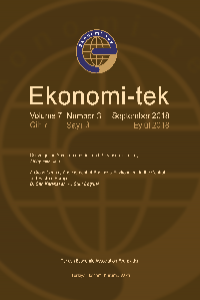Some Observations on the Global Economy and ICE-TEA 2014
The aim of this essay is to share a few of my observations on the global economy, especially as they relate to several of the presentations and discussions at the recent Fourth International Conference on Economics of the Turkish Economic Association (ICE-TEA 2014). In this context, my main concern is with the world economy’s stability and prospects for low or no growth in the years ahead. Side issues here encompass income and wealth distribution and the savings of the poor. Among the interesting papers heard at this conference was one that explained the relationship between income and employment on the one hand and religiosity on the other. Another examined the relationship between income/growth and education on one side and terrorism on the other. Yet another one dealt with the evolution and survival of capitalism. My brief reviews of these and other invited papers appear herein. The essay also provides information on the topics of the sessions and the participants
in this conference.
Anahtar Kelimeler:
Global stability and growth, religiosity, poverty, terrorism, state of economics
Some Observations on the Global Economy and ICE-TEA 2014
The aim of this essay is to share a few of my observations on the global economy, especially as they relate to several of the presentations and discussions at the recent Fourth International Conference on Economics of the Turkish Economic Association (ICE-TEA 2014). In this context, my main concern is with the world economy’s stability and prospects for low or no growth in the years ahead. Side issues here encompass income and wealth distribution and the savings of the poor. Among the interesting papers heard at this conference was one that explained the relationship between income and employment on the one hand and religiosity on the other. Another examined the relationship between income/growth and education on one side and terrorism on the other. Yet another one dealt with the evolution and survival of capitalism. My brief reviews of these and other invited papers appear herein. The essay also provides information on the topics of the sessions and the participants
in this conference.
Keywords:
Global stability and growth, religiosity, poverty, terrorism, state of economics,
___
- Acemoglu, Daron and James A. Robinson, (2012), Why Nations Fail. New York: Crown Publishers.
- Colander, David, (2014), “Capitalism as a Complex Evolving System,” Ekonomi-tek, 3 (1) January, pp. 13-22.
- Enders, Walter, Gary A. Hoover, and Todd Sandler, (2014), “The Changing Nonlinear Relationship between Income and Terrorism,” Paper presented at the 4th International Conference on Economics of the Turkish Economic Association, October 18-20, 2014, Antalya, Turkey.
- Esteban, Joan, Gilat Levy, Laura Mayoral, (2014), “Liberty, Equality, Religiosity,” Paper presented at the 4th International Conference on Economics of the Turkish Economic Association, October 18-20, 2014, Antalya, Turkey.
- IMF, (2014), IMF Multilateral Policy Issues Report – 2014, Spillover Report.
- IMF Policy Paper, July 29, Washington DC: IMF. http://www.imf.org/external/np/pp/eng/2014/062514.pdf
- Impullitti, Giammario and Omar Licandro, (2014), “Trade, Firm Selection, and Innovation: The Competition Channel,” Paper presented at the 4th International Conference on Economics of the Turkish Economic Association, October 18-20, 2014, Antalya, Turkey.
- Kaminsky, Graciela, (2014), "Varieties of Sovereign Crises: Latin America, A Historical Perspective," Paper presented at the 4th International Conference on Economics of the Turkish Economic Association, October 18-20, 2014, Antalya, Turkey.
- Piketty, Thomas, (2014), Capital in the Twenty-First Century. NewYork: Belknap Press/ Harvard University Press.
- Rojas-Vallejos, Jorge and Stephen J. Turnovsky, (2014), “The Consequences of Tariff Reduction for Economic Activity and Inequality,” Paper presented at the 4th International Conference on Economics of the Turkish Economic Association, October 18-20, 2014, Antalya, Turkey.
- Uygur, Ercan, (2011), “Domestic Savings in Turkey: Policy, Institutional and Legislative Framework,” Background study for the Country Economic Memorandum. Ankara: The World Bank.
- ISSN: 2146-6173
- Yayın Aralığı: Yılda 3 Sayı
- Başlangıç: 2012
- Yayıncı: Türkiye Ekonomi Kurumu Vakfı
